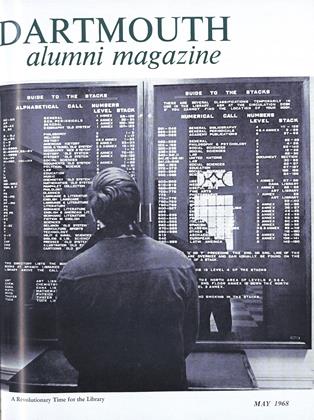Selected by Richard Eberhart '26 and AlexanderLaing '25. Wood engraving byStanley L. Rice '45. Hanover: DartmouthPublications, 1967. 31 pp. $2.
The authors are four recent graduates, ten seniors, one junior, and one sophomore. What moves them? What does not? Old-fashioned romantic love does not. An "angry young man" with a junkie as whore and a sense of humor is about to burn his library card. Last line: "It's a start." Without a capital letter or a mark of punctuation, a poem of 45 lines examines the lure of women (corrupting) and self-love (corrective). It is unlikely that another poet has a broken heart when he sensuously recalls a girl in a tight blouse running after a little rabbit.
Love of family? Mildly philoprogenitive, one undergraduate places in conjunction the death of a grandmother, a wife in labor, and a new-born infant, whose "breathing screams ... commands us all." A second regrets the death of another man's son from pneumonia and extols the healthy existence of his own who only coughs facetiously. The most surprising is perhaps a poet-son who expresses nostalgia for his mother capable of telling him fairy stories. He longs for her "withered lap" whereon he may cry himself "into quiet sleep at last."
Nature? One student tries to explain why in Spain the sun is so bright and the shadows so deep. Another hopes that Magalloway Mountain, abandoned by moose preferring the Laurentians, may revert to primitive wilderness.
The affluent society and slum areas? "Two Street Poems" consider (1) the Dutch elm disease in New Hampshire and (2) mail boxes which disappoint the author because when he drops "another bit" of his "soul" into their "maws" he gets no response other than "a complacent, metallic, swinging-shut burp." Still another street with a fish market, a fruit stand, and a bakery provides color and drama. Well-to-do persons condescendingly drop off Thanksgiving baskets for the poor. "Ode to a Four-Speed Box" praises a racing car capable of breakneck flight in a nocturnal and friendless hour.
„ Death? We may attend a funeral with rotting flesh" inside a "polished wood casket." War? Only in one poem. The children's joyous play of cowboys and Injuns is carried to sinister lengths in Vietnam.
Dartmouth purports to be a liberal arts college. What about studies and past civilizations? The best poem, "The Attic Head," suggests the mystery of the "frozen word sealed/Between the smooth stare/Of chiseled eyes/And the wayward/Look of youth." A second characterizes Tangier as "a naked and promiscuous bride of the North," who has enslaved both antiquity and modern times. A third begins, "I lie assassinated in the jungle of my ignorance."
One searches in vain for what one naively expects for stimuli: drugs and dreams, Negroes and race riots, President Johnson as social reformer and Far Eastern civilizing force, the soul and Madison Avenue. Conventional prosody is ignored. Missing are attacks on the tyranny of Dartmouth administrative officers and boastful assertions about the reliable maturity of undergraduates interested in emancipated girls and permissive parietals.
Despite the limitation in scope, however, one may be impressed with these poets' articulateness and experimentation, seriousness of purpose, and sophisticated humor and wit, sometimes bordering on the macabre.
 View Full Issue
View Full Issue
More From This Issue
-
 Feature
FeatureThe Making of a Primary Winner
May 1968 By WINTHROP A. ROCKWELL '70 -
 Feature
FeatureDartmouth's Alumni Relations
May 1968 -
 Feature
FeatureThe Library Revolution
May 1968 By Clifford L. Jordan '45 -
 Article
ArticleOxford Revisited
May 1968 By JOHN G. GARRARD, -
 Article
ArticleThe Undergraduate Chair
May 1968 By JOHN BURNS '68 -
 Class Notes
Class Notes1941
May 1968 By EARL H. COTTON, ROBERT G. THOMAS
JOHN HURD '21
-
 Books
BooksEVERY DOG SHOULD HAVE A MAN.
December 1952 By John Hurd '21 -
 Books
BooksWOODSMOKE AND WATER CRESS.
JANUARY 1966 By JOHN HURD '21 -
 Article
ArticleFurther Mention
OCTOBER 1971 By JOHN HURD '21 -
 Article
ArticleFurther Mention
JANUARY 1973 By JOHN HURD '21 -
 Article
ArticleFurther Mention
JULY 1973 By JOHN HURD '21 -
 Article
ArticleRed, Cav, Tuss, and The Ferocious Cherub
December 1973 By JOHN HURD '21
Books
-
 Books
BooksGreat Escapes
MARCH | APRIL 2021 -
 Books
BooksAND HOW DO WE FEEL THIS MORNING?
JULY 1964 By CLIFF JORDAN '45 -
 Books
BooksFIFTY HIKES: WALKS, DAY HIKES, AND BACKPACKING TRIPS IN NEW HAMPSHIRE'S WHITE MOUNTAINS.
JULY 1973 By CLIFFORD L. JORDAN JR. '45 -
 Books
BooksQUICK GUIDE TO CHEESE. HOW TO BUY CHEESE HOW TO KEEP CHEESE HOW TO SERVE CHEESE HOW TO SELECT CHEESE.
November 1973 By John Hurd '21 -
 Books
BooksMEDICAL HISTORY, HUMANISM, AND THE STUDENT OF MEDICINE.
December 1960 By JOHN P. BOWLER '15 -
 Books
BooksBound by Emotion
NOV. 1977 By R.H.R.

